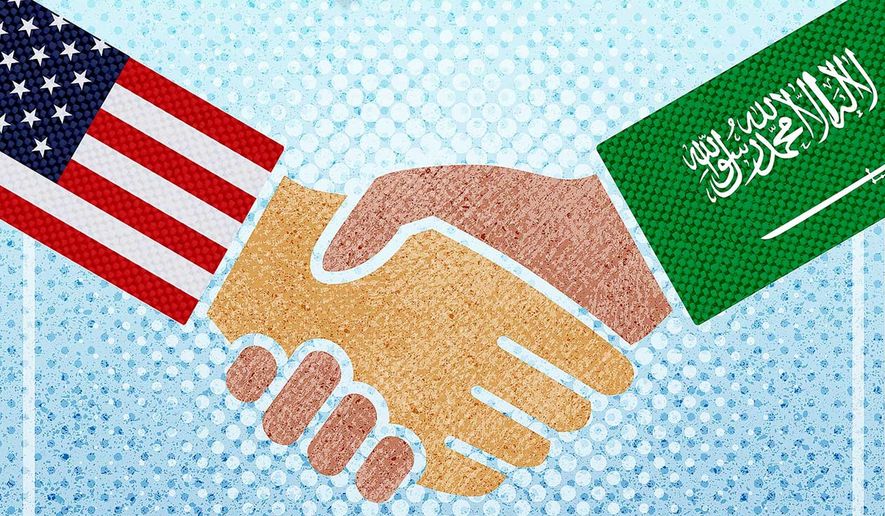OPINION:
By partnering with Russia to bring more death and destruction to Ukraine, the Iranian regime has, in effect, become the aircraft carrier of Moscow on the global stage, posing a direct threat to American national security interests, especially in the energy-rich Persian Gulf.
To counter this evil alliance, the U.S. must immediately, unequivocally and forcefully embrace the leader of Saudi Arabia’s reform movement, Prime Minister Crown Prince Mohammed bin Salman, who is known as MBS. Showing Washington’s full support for Saudi Arabia and its consequential leader can act as a counterweight against the dangers posed to global security by the Moscow-Tehran axis. Washington can start this process by acknowledging the truly revolutionary changes in the economic, cultural and social spheres underway in Saudi Arabia.
According to the International Monetary Fund, Saudi Arabia was one of the fastest-growing economies of 2022 and is estimated to have a gross domestic product of over $1 trillion within a few short years. Therefore, embracing the MBS economy would be in America’s commercial as well as national security interest.
The crown prince’s ambitious yet pragmatic plan to become a global economic powerhouse is encapsulated in his “Vision 2030” blueprint. According to his MIT-trained minister of economy and planning, Faisal Al-Ibrahim, the pillars of MBS’ “Vision 2030” are: “First, to continue playing a stabilizing role as the world’s most important energy exporter. Second, to diversify the economy away from dependence on the oil and gas industry. Third, to become a global leader on pragmatic solutions to climate change. Fourth, to invest in small and medium-sized businesses. Fifth, the empowerment of women to take their rightful place in the economic development of Saudi Arabia. And finally, enhancing Saudi Arabia’s profile as a tourist destination.”
The underlying premise of MBS’ “Vision 2030” is clear: good governance. In other words, to provide the citizens of his strategically significant country the means to prosper in the dynamic and innovation-driven global economy of the 21st century.
For example, when it comes to the kingdom’s role as the world’s most important oil exporter, the crown prince knows that tying Saudi Arabia’s budget to the vicissitudes of global oil prices can negatively affect his fellow citizens. Therefore, he has instructed his economic team to look for other sources of revenue for the country by investing in the non-oil sector.
According to Mr. Al-Ibrahim, this means a national effort to help Saudi Arabia’s small and medium-sized businesses integrate into the global economy, thus creating thousands of jobs for Saudi youth. Furthermore, this diversification entails an emphasis on promoting the country as a tourist destination. Anyone who has snorkeled in the Red Sea or spent a night gazing at the flashing stars while lying in the “Rub-al-Khali” (“Empty Desert”) can attest to the enormous potential of this beautiful country as a tourist destination, including Americans. The empowerment of Saudi women is another integral part of MBS’ economic reforms because he understands that Saudi women must play a key role if their nation is to become a global economic powerhouse.
The experienced minister of investment, Khalid Al-Falih, is helping to realize MBS’ vision to see Saudi Arabia become a global hub for innovative technologies in the fields of artificial intelligence and renewable energy. For example, the batteries that will power electric vehicles, smartphones and consumer electronics are a major focus of Mr. Al-Falih. These two sectors alone are estimated to be worth over $2 trillion by 2030 and provide a massive opportunity for U.S. companies to establish a hub in Saudi Arabia.
Unlike America’s elitist climate czar, John Kerry, MBS is the real climate warrior because he has set his sights on what is the most practical, job-creating and health-promoting way to fight climate change — namely, planting trees, which in turn capture carbon from the atmosphere. The health benefits of planting trees in urban areas is of special interest to MBS because 40% of his fellow citizens are under the age of 25. To the extent that air quality is improved through tree planting, it improves the health outcomes for this young population.
Expanding the nonprofit sector of Saudi Arabia to become an engine of economic growth is another major initiative of MBS. He understands the central role charitable giving plays in lifting the human spirit. For example, last year, Ehsan, the Saudi philanthropy platform, raised over $500 million for charities in the kingdom. And since MBS wants Saudi Arabia to play an active role in global philanthropy, he has instructed his minister of finance, Mohammed Al-Jadaan, to attach conditions to foreign aid in order to bring long overdue transparency and accountability to the $1 trillion global philanthropy market. Making Saudi Arabia a global leader in accountable charitable giving will be one of MBS’ lasting legacies.
It is imperative that President Biden and House Speaker Kevin McCarthy invite Saudi Arabia’s reformist leader to Washington. By extending their hand of friendship to MBS, they will not only usher in a new chapter in U.S.-Saudi relations, but also enhance America’s national security in the process.
• S. Rob Sobhani is the CEO of Caspian Group Holding and author of a book on Saudi Arabia.




Please read our comment policy before commenting.